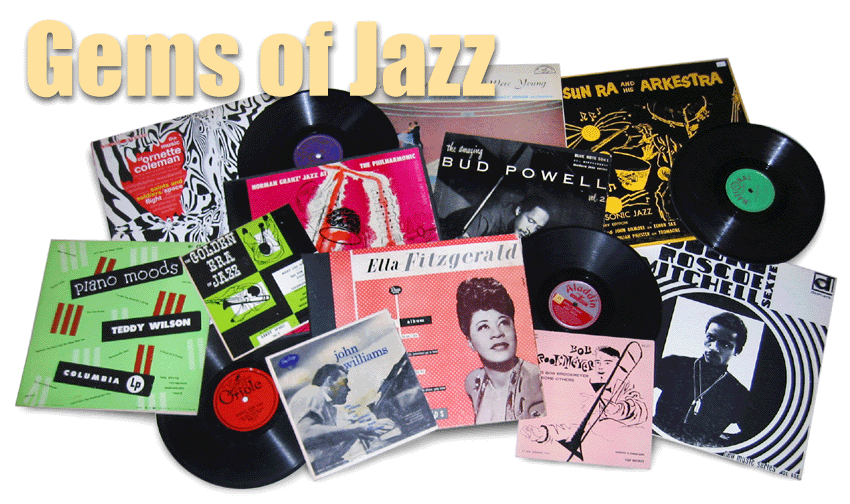Here's another Earl Hines offering – one that's a bit more contemporary than those of our previous postings. Hines has long been one of my favorite players, ever since I first heard his keyboard gymnastics on "Weather Bird" with Louis. His sense of rhythm was far more advance than any of his contemporaries, with the possible exception of James P. He just knocked me out!
I was filing away some records I'd pulled for my radio show when I came across this gem. It's another of those cheapo budget records from the early '60s, but it's not one that you see very often and the music reissued on it comes from an interesting period in Hines' career. Plus, these sides were all originally recorded for the short-lived Sunrise label in Chicago, making them pretty rare (back before the Internet, that is).
There's another reason why I decided to upload these files. The record has an interesting story behind it (are you surprised?).
When I was living in Hyde Park on the south side of Chicago, I spent a lot of time in used record stores and thrift shops. There were great records to be found there as you might imagine, and I found quite a few. One day I purchased an LP with curious notes on its backside written in blue ballpoint pen ink. The notes added information on personnel, and on session dates and locations. They also commented on the various tunes on the LP – things like "Dynamite Blowing – a Real KICK!!!" and "Slow Burner – Tpt. Solo – Bold!!!" Whoever had made the notes used exclamation points freely.
 |
| A sample of the mysterious annotations, made on a Duke Ellington record. The writer put much effort into drawing lines and curious symbols. |
I never found out the true story behind the ballpoint annotator, but I did end up with about thirty of his records. This Hines LP is one of them. The interesting thing about his notes is that he not only knows the correct date and place for Hines' Sunrise sessions, but he knows many of the players as well (more than are listed in my discography). The record itself offers no info whatsoever on the material. My question is this: How did this fellow know these things? Did he have the original Sunrise releases? Did he know one of the sidemen, or possibly Hines himself? Was he a serious hipster on the scene? This last hypothesis seems to be borne out in his liberal use of jive argot – as in "T-pipe" for "tenor saxophone."
 |
| Johnny Hartman |
 |
| The Dark Angel of the violin – Eddie South |
After 1947, Earl Hines would never again front an orchestra of his own on a permanent basis. Too bad, but then we wouldn't have his many decades of stellar trio and quartet work. So enjoy this last gasp of one Hines tradition. And see if the mysterious annotator doesn't inspire you to form your own theories about his story.
As always, these files were ripped from the original vinyl with just a mild cleaning of light pops and clicks.
Earl Hines and His Orchestra
Earl Hines
Hines, p; Morris Lane, ts; Eddie South, vi; Bob Wyatt, org; Ernest Ashley, g; unk. b, d.
Chicago, IL; December 1947
1. Honeysuckle Rose
2. Dark Eyes
3. Blues for Garroway
Hines, p; Duke Garette, tp; Bobby Plater, as; Morris Lane, ts; Charlie Fowlkes, bar; Bill Dougherty, vi; Bill Mackel, g; Charles Mingus, b; Curley Hamner, d; Wini Brown, unk., v.
Chicago, IL; December 1947
4. The Sheik of Araby
5. No Good Woman Blues
Hines, p; prob. Willie Cook, Vernon Smith, Fats Palmer, Charlie Anderson, tp; Bennie Green, Walter Harris, Gordon Alston, tbn; Clifton Small, tbn, p; Scoops Carey, Thomas Crump, as; Ernie Wilkins, Budd Johnson, ts; Wallace Brodis, bar; Bob Wyatt, org; unk., vbs; Skeeter Betts or Bill Mackel, g; Calvin Ponders, b; Gus Johnson, d; Johnny Hartman, Melrose Colbert, v; unk. string section.
Chicago, IL; late 1947
6. Ain’t Misbehavin’
Personnel as 4, 5:
7. Bow-legged Mama
Personnel as 6:
8. Black and Blue
9. I Need a Shoulder to Cry On
Personnel as 4, 5:
10. My Name Is on the Doorbell
Find it here: https://www.mediafire.com/?emw51rme3yyr1n2








